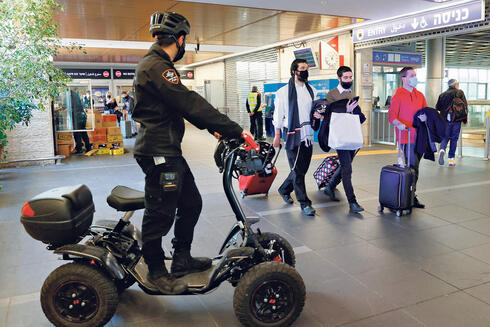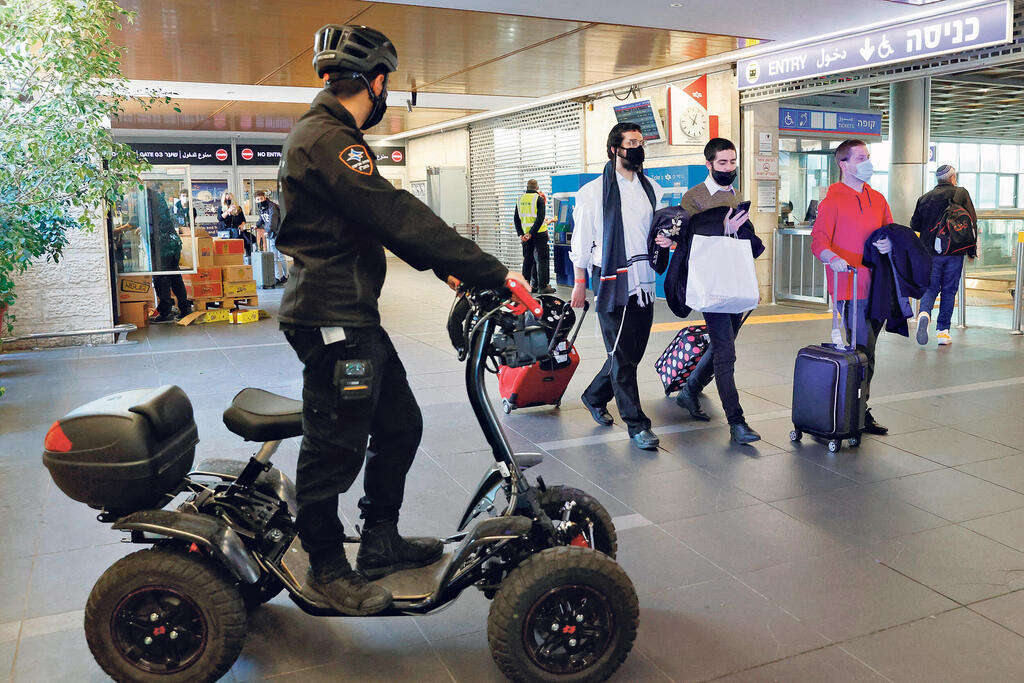
Israel Police using controversial profiling algorithm at airport in fight against drugs
The AI profiling system being used by police at Ben-Gurion Airport aims to identify who might be smuggling drugs based on undisclosed data and regardless of any actual suspicion
A routine hearing that took place recently at the Central District Court in Lod dealt with a man who was detained by the police at Ben-Gurion Airport. During a search, substances suspected of being dangerous drugs were found in his possession. The same person (whose name is prohibited from publication) claimed that his detention and search were done illegally, and randomly, because he has no criminal record and the police did not have any actual reason to suspect him.
In order to defend his detention and the search that was carried out, the police made a dramatic claim before Judge Merav Greenberg. According to the prosecutor's office representative at the hearing, the person arrested "showed up in the system as someone who should be searched for drugs. It was not a random search, we are using intelligence systems."
This was rare occurrence in which police admitted that they are operating a profiling system at the airport in order to locate drug smugglers. The system is used on citizens who land in Israel, even on those for whom there is no intelligence information regarding the smuggling of drugs, there is no reasonable suspicion that they might be doing so, and they have not previously been convicted of drug offenses.
Police are refusing to give details about how the system works, certainly not to the suspects but also not to the courts. Or, in the words of Judge Greenberg at the hearing, "We received no clarification on how the system works and on what basis of information people are added to the list. There is no claim that the inclusion (of a suspect, TG) is based on concrete information."
The accumulation of data within the system and the sources from which it is fed are not specified. The significance given to each parameter, which results in the inclusion of a citizen without a criminal record in the list produced by the computerized system, is unknown. The courts, for example, do not know which of the possible parameters - appearance, gender, residence, origin, sexual orientation, financial situation, etc. - may lead to a person being "called out" by the system. This means that the supervision and control of the system is limited, to non-existent.
The judges also have no idea how the algorithm operates, and how it decides to signal to police who will be detained and whom to look for. Supreme Court judge Anat Baron, who received the appeal stated: "What is the generalization method? I don't even know."
Not just the police database
According to information received by Calcalist, the profiling system processes and analyzes a repeated pattern of those caught in the past at airports in Israel, and crosses it with other parameters collected from other systems that the police have access to. The system, according to a person familiar with its operation, draws data on citizens from police databases and also from government databases to which it has access. For example, from the computers of the Ministry of the Interior, where there is data such as gender, place of residence or marital status and names of relatives, or the computers of the Ministry of Welfare, where there is data about socio-economic status. On the basis of the data and past police experience, the system monitors passengers who arrive at the airport and apparently match the profile.
When a citizen lands from abroad and their name appears on the list they will be detained even before entering the country. At the stage when they scan their way through an automatic machine to get a pass into the country, the computer will refuse to issue the pass and the citizen will be directed to border control. A policeman, who already knows the reason for the delay, will arrive at the scene. They will accompany the citizen to collect their luggage and then conduct a search of their body and luggage, and even an internal physical search (physically or with a mirror machine). All this, as mentioned, without having any prior intelligence or suspicion regarding that person. According to the judges, the procedure raises questions about the very legality of using the system.
Only the policeman knows why they were detained
The police integrated the profiling system through a pilot at the airport in the middle of the previous decade. According to a source at the police, it was put into use with the approval of the Ministry of Justice. It is not clear which authorities subsequently approved the system's permanent use, and it is impossible to find procedures and instructions for using the system in the records. According to the source, the profiling system in Israel is based on a long-standing system previously developed by the police, "Malechet Machshevet”, which was launched in September 2007. The annual police report that year stated that Malechet Machshevet is "a system designed to provide an up-to-date, focused and high-quality intelligence picture for decision-makers at the supervisory and field level."
The same report also states that "the system is able to collect materials from an unlimited number of sources, integrate the information, analyze and retrieve it and turn it into knowledge." According to the report, the system includes "several subsystems, and it can analyze information according to connections and their visual presentation, manage geographic information, alerts, etc." One of the characteristics of "Malechet Machshevet" relevant to the system is its ability to generate possible "connections." According to the 2007 report, the system has a "complex ability to investigate and present relationships between populations, organizations, vehicles, local activity, documents, etc."
The algorithm used at the airport can decide, independently, what significance will be given to each piece of data that it has access to. It is programmed so that it examines, based on the information accumulated, who may be a potential smuggler. Information that may appear trivial - place of residence or age, for example - can, in principle, when cut or crossed with additional data, label an innocent person as a possible smuggler. Anyone who has ever built a data-based model knows that the significance given to each piece of data can result in a biased outcome.
Studies, as well as accumulated experience, show that such systems often include understandable biases, and artificial intelligence is often based on humans entering data according to their understanding.
A source familiar with the system stated that a minimum "action threshold" was defined, only above which it begins to check passengers and generate names. The same source refused to disclose what that threshold is. According to another source familiar with the system, it is a threshold that many citizens may potentially easily cross, even though there is no reasonable suspicion or intelligence regarding any wrongdoing. This means that citizens may enter the list and be detained relatively easily, for a reason that is known only to the enforcement agents and is not exposed to the public.
"Difficulty in judicial review"
In the legal system, in recent years, eyebrows have been raised regarding the use of the system and substantial questions have arisen regarding the legality of the use of computerized generalization methods. Judge Greenberg, for example, stated that "the issues raised by the defense are complex, and require in-depth clarification and a thorough examination of all aspects related to the generalization method." She referred to the use of the list as a method for identifying drug dealers and wrote: "It cannot be ignored that the state's explanations in this matter are insufficient," and finally wondered: "Whether including a person on the list, for an unknown reason, will serve as an 'open ticket', a legal basis for a search conducted anywhere at anytime.”
What’s more, according to Judge Greenberg, the court did not know about the existence of the system at all, and the question of the police's authority to use it is not clear. "In the absence of any information about the method and its application, there is difficulty in submitting it for judicial review." Greenberg writes that "conducting a search of a person or their body involves a serious violation of their constitutional right to privacy. It is established that, in the absence of an explicit authorization by law, such searches should not be conducted, and to the extent that the search is conducted illegally, the use of its output may be limited."
The appeal, as mentioned, was brought before Judge Anat Baron of the Supreme Court. Although it was rejected, the judge did not spare criticism regarding the use of the system by police: "Indeed, the manner in which the petitioner was arrested at the airport when he was located by the 'generalization method'... a method whose nature, at least at this stage, cannot be verified - causes difficulty and the question arises whether the search was carried out illegally."
The Shin Bet uses it as well, but according to procedure
The Israel Security Agency (Shin Bet) also uses an inclusion list in relation to those landing in Israel. However, its use is to prevent terrorist activity and is anchored in legislation and procedures. Among other things, citizens who are included in the list are informed of this, and they have the option of contesting it. The agency's use of the list was exposed in the High Court in Parnas vs the Minister of Defense from 1993, in which three Israeli citizens - a lecturer at Tel Aviv University who was active in protest organizations, a film director who lived in the Netherlands, and another Israeli who lived abroad - claimed that when they left or entered Israel, their bodies and luggage were searched, and sometimes their documents were taken to be photocopied.
The state explained that the agency's inclusion of a person in the border control list (Called "Rotem" since 2006), "is based on security information collected... Among those included in the lists are people whose information indicates an ongoing relationship with terrorist elements abroad. Sometimes this relationship is based on their identification and support of a certain way of life." The court accepted the state's position that the action of collecting information and detaining citizens is permitted by virtue of the emergency orders in place to protect the security of the state.
The Ministry of Justice said in response: "The issue is in judicial proceedings. Please note that as part of the proceedings there is confidentiality and parts of it are under a publication ban at this stage."
The police said in response: "By virtue of the Narcotics Ordinance, the police may search the body of any person without suspicion upon entering an airport, an aviation facility, a port, a border station or a point of entry into or out of the country, for the purpose of detecting drug offenses.
"The appeal is dealing with issues that are at the core of a judicial proceeding that has not yet ended, and some of the requested information is under confidentiality and is prohibited from publication at this stage, therefore we cannot refer to the content of the proceeding or part of it."















